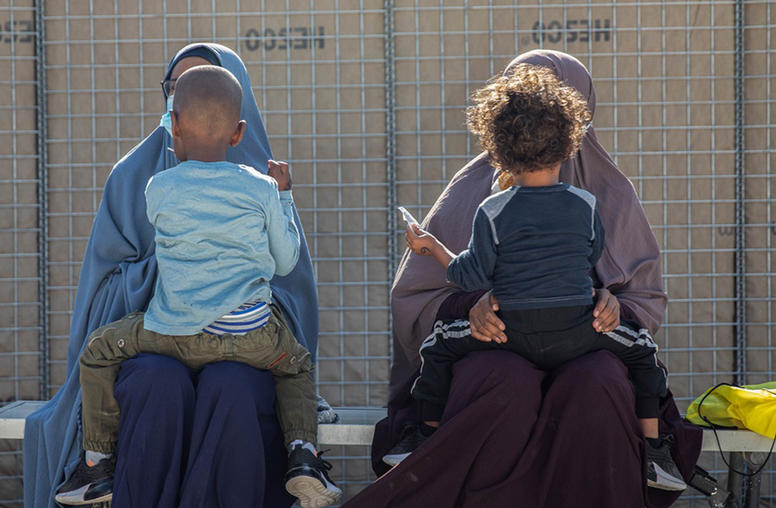"The Assad Regime Will Collapse"
Four members of the newly formed Syrian National Council (SNC) appeared at USIP in Washington for “Voices from the Front Lines: an Update on the Syrian Opposition.” The members are determined to create a representative, effective group that is a viable alternative to the regime of Bashar al-Assad in Syria.
October 13, 2011
Members of the newly formed Syrian National Council are determined to create a representative, effective group that is a viable alternative to the regime of Bashar al-Assad in Syria. And they are confident the 48-year-old regime will fall - it’s just a matter of when.
“The Assad regime will collapse,” Murhaf Jouejati, a member of the SNC, predicted at an event at USIP Oct. 13. “There is too much blood and the distance between regime and society is too wide,” said Jouejati, also a professor of Middle East studies at National Defense University’s Near East South Asia Center for Strategic Studies.
He was one of four members of the SNC appearing at USIP in Washington for “Voices from the Front Lines: an Update on the Syrian Opposition.” The Syrian government has used massive force to try to hold down the uprising and is blamed for killing more than 3,000 people and arresting tens of thousands more. A fifth member of the SNC who was to appear at the USIP event via Skype from Damascus canceled out of fear for his safety. In that context, the panel discussion touched on the future of the SNC and the Assad regime, the role of women in the uprising and if the possibility existed that the opposition group could reach a negotiated settlement with the sitting government.
The challenges confronting the SNC are many. Jouejati predicted that Assad will not leave on his own, and that the demise of the regime will come in one of two ways: “if in the end units of the military do not topple the regime, it will be the crumbling economy that will,” he said.
SNC: A WORK IN PROGRESS – Members of the SNC appearing at USIP took pains to insist that theirs is a representative group that welcomes and includes all Syrians. Indeed, said Najib Ghadbian, an SNC member and a professor at the University of Arkansas, many Syrians carried signs that read “SNC Represents Me” soon after the formation of the council was announced, suggesting the opposition group is seen as an inclusive organization, he said. Another panelist agreed: “we want to make sure all people in Syria… that they are all represented,” said Dima Moussa, another SNC member affiliated with the Human Rights Institute of Depaul University in Chicago.
She noted that groups as disparate as the Kurds, the Assyrians, Christians and other Muslim sects all belong. “This is a continuing process,” she said. “It doesn’t stop here.”
SPACE FOR WOMEN – USIP’s Steven Heydemann, who moderated the event, asked what role women will play in a post-Assad Syria, noting that after initial bursts of activism in some Arab Spring countries, women have in some ways been marginalized. “Has the SNC given any thought to the question of how to sustain opportunities and frameworks for the active participation of women, both in the uprising as well as on the day after and beyond” after Assad, he asked.
“We agreed that all groups should have woman representation,” Ghadbian said, noting that women should be encouraged to participate but that the SNC already includes prominent women. “We don’t want token women, we want highly-qualified women,” he said.
Sometimes women shut themselves out, said Moussa: “We’re not going to lie, it’s part of our culture… men don’t give opportunities but sometimes women withdrawal themselves from the opportunities.”
IS A NEGOTIATED SETTLEMENT POSSIBLE? – The sentiment was that this is unlikely. “We clearly do not have an official position on this but I think we do embrace the revolutionaries’ position, basically rejecting to negotiate with those who have been responsible for killing civilian protesters,” said Ghadbian. He indicated the SNC would, however, negotiate with anyone else.
A PLEA FOR HELP – Meanwhile, the violent crackdown of opponents to the Assad regime continues, creating an ever greater sense of urgency among regime opponents. In fact, Riad Seif, another member of the SNC who was to appear at the USIP event via Skype, canceled out of fear of further physical recriminations against him by the regime. Members of the SNC are asking for more help from the international community to undermine the Assad regime and force change.
“We need fast action from our friends close and far,” said Ausama Monajed, another SNC member and executive director of the Strategic Research and Communication Centre in London.
Monajed noted that immediate recognition by the international community of the SNC as “a legitimate representation of the Syrian people” would go a long way to helping the SNC’s cause within Syria. The business community can also help, panelists said. “Cut all economic ties with the regime to ensure isolation and all other countries to follow suit,” said Monajed.
WHEN GOOD MEN DO NOTHING – Evil will triumph when good men do nothing, said Monajed – invoking the line typically attributed to the Irish philosopher Edmund Burke – and appealed for help so the Syrian opposition can persevere as opposition movements have across the Middle East. “Syria’s dream is your dream as well,” said Monajed. “Together we can make this happen.”
Explore Further
- Countries and Regions: Syria
- Voices from the Front Lines: Update on the Syrian Opposition
USIP Event | October 13, 2011 - Syria's Opposition Takes Form
On the Issues by Steven Heydemann | October 2011



